实验2 C语言分支与循环基础应用编程
实验2
实验任务1
task1.c
代码:
#include <stdio.h>
#include <stdlib.h>
#include <time.h>
#define N 5
int main() {
int number;
int i;
srand(time(0)); // 以当前系统时间作为随机种子
for(i = 0; i < N; ++i) {
number = rand() % 100 + 1;
printf("20240042%04d\n", number);
}
system("pause");
return 0;
}
运行结果:
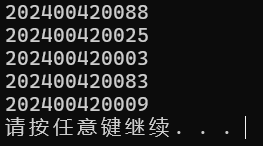
问题:
问题一:
将1~100内的一个随机数赋值给number
问题二:
将number被赋值的数,以四个字符宽度跟在“20240042”后输出
问题三:
程序的功能是得到学号从202400420001到202400420100的随机五个学生的学号
实验任务2
task2.c
代码:
#include <stdio.h>
#include <stdlib.h>
int main() {
int choice, quantity;
float total_price = 0, amount_paid, change;
while (1) {
printf("\n自动饮料售卖机菜单:\n");
printf("1. 可乐 - 3 元/瓶\n");
printf("2. 雪碧 - 3 元/瓶\n");
printf("3. 橙汁 - 5 元/瓶\n");
printf("4. 矿泉水 - 2 元/瓶\n");
printf("0. 退出购买流程\n");
printf("请输入饮料编号: ");
scanf("%d", &choice);
if (choice == 0)
break;
if (choice < 1 || choice > 4) {
printf("无效的饮料编号,请重新输入。\n");
continue;
}
printf("请输入购买的数量: ");
scanf("%d", &quantity);
if (quantity < 0) {
printf("购买数量不能为负数,请重新输入。\n");
continue;
}
switch (choice) {
case 1:
case 2:
total_price += 3 * quantity;
break;
case 3:
total_price += 5 * quantity;
break;
case 4:
total_price += 2 * quantity;
break;
}
printf("请投入金额: ");
scanf("%f", &amount_paid);
change = amount_paid - total_price;
printf("本次购买总价: %.2f 元\n", total_price);
printf("找零: %.2f 元\n", change);
total_price = 0;
}
printf("感谢您的购买,欢迎下次光临!\n");
system("pause");
return 0;
}
运行结果:
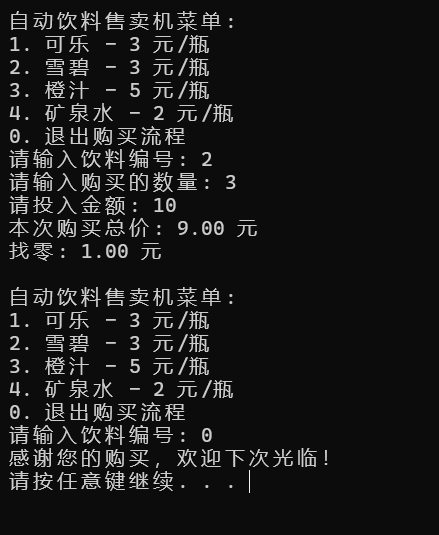
问题:
问题1:
将total_price赋值为零,即将饮料总价还原为零。如果去掉,用户下一次购买饮料的饮料总价会加上上一次购买的价钱
问题2:
使用break语句,使当前while语句循环结束。在此场景中控制,当客户输入0时,取消贩卖机贩卖饮料并输出欢迎购买。
使用continue语句,仅结束本次循环的剩余部分。20-23行,如果顾客输入的choice满足此次if判断条件,输出提示后结束此次循环,进入下一次while循环,让顾客重新输入choice的值。28-31同理。
问题3:
不需要。因为choice<1和choice>4的情况已经被20-23行的if语句判断过了,只要choice输入整数,就一定会有输出。
实验任务3
task3.c:
代码:
#include <stdio.h>
#include <stdlib.h>
int main(){
char symbol;
while(scanf_s("%c",&symbol)!=EOF){
scanf_s("%*c");
switch(symbol)
{
case 'r':
printf("stop!\n");
break;
case 'g':
printf("go go go\n");
break;
case 'y':
printf("wait a minute\n");
break;
default:
printf("something must be wrong...\n");
break;
}
}
system("pause");
return 0;
}
运行结果:
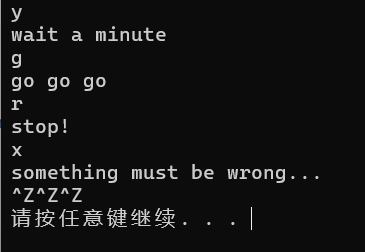
实验任务4
task4.c:
代码:
#include <stdio.h>
#include <stdlib.h>
int main(){
double total_price=0,spe;
double max,min;
printf("输入今日开销,直到输入-1终止:\n");
scanf_s("%lf\n",&spe);
max=spe,min=spe;
while(spe!=-1)
{
total_price+=spe;
if(spe>max)
{
max=spe;
}
if(spe<min)
{
min=spe;
}
scanf_s("%lf",&spe);
}
printf("今日累计消费总额:%.1f\n",total_price);
printf("今日最高一笔开销:%.1f\n",max);
printf("今日最低一笔开销:%.1f\n",min);
system("pause");
return 0;
}
运行结果:
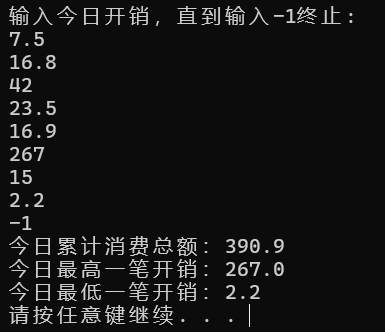
实验任务五
task5.c
代码:
#include <stdio.h>
#include <stdlib.h>
#include <time.h>
#define N 3
int main(){
int day,stday;
int i;
srand(time(0));
stday=rand()%30+1;
printf("猜猜2025年4月哪一天是你的lucky day\n");
printf("开始喽,你有三次机会,猜吧(1~30):");
scanf_s("%d",&day);
for(i=1;i<N;++i)
{
if(day==stday){
printf("哇,猜中了:-)\n");
break;
}
if(day<stday){
printf("你猜的日期早了,你的lucky day还没到呢\n");
printf("再猜(1~30):");
}
if(day>stday){
printf("你猜的日期晚了,你的lucky day在前面哦\n");
printf("再猜(1~30):");
}
scanf_s("%d",&day);
}
if(i==3)
{printf("次数用完啦。偷偷告诉你,4月你的lucky day是%d号\n",stday);}
system("pause");
return 0;
}
运行结果:


实验任务6
task6.c:
代码:
#include <stdio.h>
#include <stdlib.h>
int main() {
int n, i, j;
printf("input n: ");
scanf("%d", &n);
for (i = n; i >= 1; --i)
{
for (j = 0; j < n - i; ++j) {
printf(" ");
}
for (j = 0; j < 2 * i - 1; ++j) {
printf(" 0 ");
printf(" ");
}
printf("\n");
for (j = 0; j < n - i; ++j) {
printf(" ");
}
for (j = 0; j < 2 * i - 1; ++j) {
printf("<H>");
printf(" ");
}
printf("\n");
for (j = 0; j < n - i; ++j) {
printf(" ");
}
for (j = 0; j < 2 * i - 1; ++j) {
printf("I I");
printf(" ");
}
printf("\n");
for (j = 0; j < n - i; ++j) {
printf(" ");
}
printf("\n");
}
system("pause");
return 0;
}
运行结果:
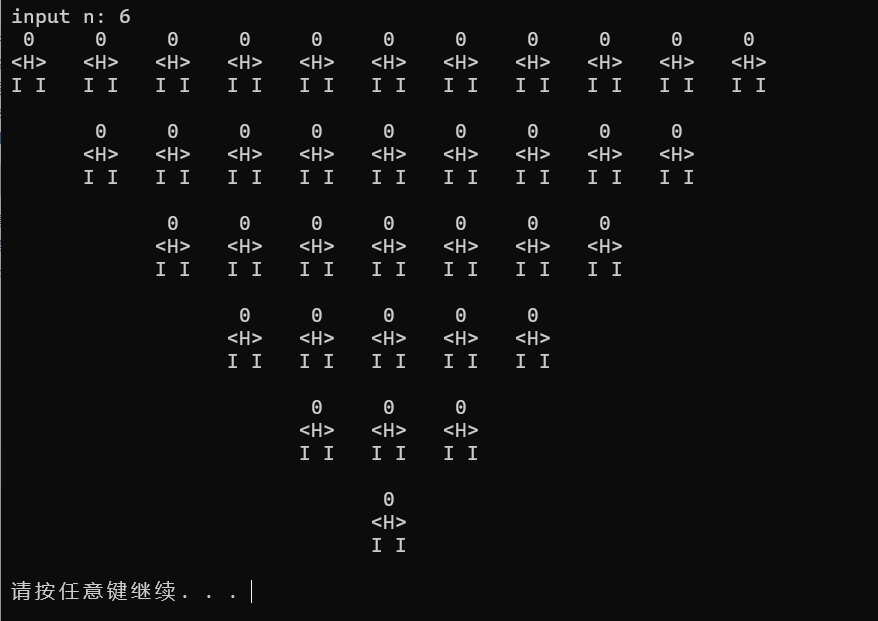
实验总结
- 本次试验学习了获得随机数的方法,以当前系统时间作为随机种子。
- if、switch语句选择使用,可以使代码更简洁易懂。



 浙公网安备 33010602011771号
浙公网安备 33010602011771号